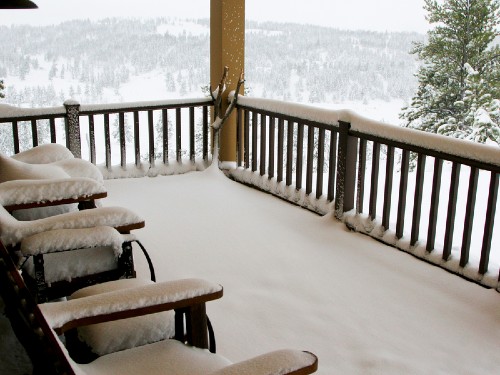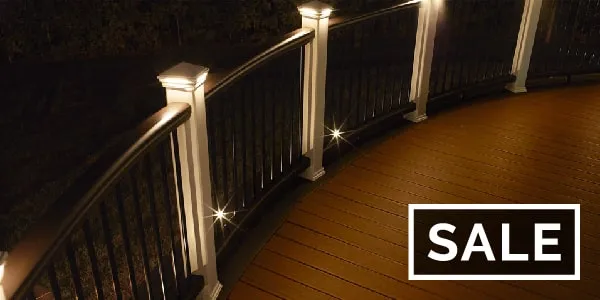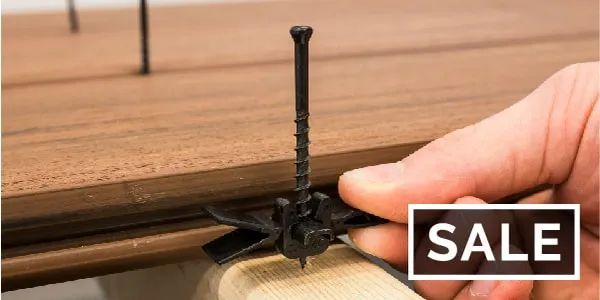Guide to Deck De-Icers
On some winter days, nothing can feel nicer than grabbing a warm cup of coffee or tea and appreciating the natural beauty of your snow-covered backyard. Whether alone or with family and friends, keeping your outdoor living space open and safe will help everyone enjoy their time outside even more.
But after spending time and money on creating the perfect deck, porch, or patio space; the last thing DIY deck builders and deck owners want to do is possibly damage the wood deck framing, natural or composite deck boards, and deck hardware with the wrong de-icer or chemicals!
De-Icers for Wood and Composite Decks
Selecting the wrong deicer can significantly reduce the life of the wood and fasteners in the deck. Read through the details of the de-icer options below to find the perfect one for your home, yard, and surrounding vegetation.
De-Icers and Decks
Sodium Chloride (AKA Rock Salt)
Sodium chloride is inexpensive and helps keep moisture from accumulating on roads and walkways, but it is not an effective deicer at low temperatures only good down to 15°F, damages concrete, poisons the soil, and can kill plants and harm pets.
Rock salt can be a solid option if you're living in a pet-free home without any surrounding plants or vegetation. If you're living in a climate where the lowest winter temperatures you usually experience hover around 10° to 15° F - selecting sodium chloride would be a great choice for your decking and budget.
Calcium Chloride
Calcium chloride is the most frequently recommended ice-removing agent from top composite decking manufacturers!
Calcium chloride works at very low temperatures and isn't quite as damaging to the soil and vegetation as sodium chloride, though it costs a bit more and may harm any concrete or masonry in the deck footings or pathways. Calcium chloride develops more moisture than other de-icing agents meaning that calcium chloride won't keep surfaces dry but rather slushy.
On the other hand, prolonging a wet decking surface can be a good thing as calcium chloride releases heat when reacting with water, so it can melt snow and ice on contact.
Potassium Chloride
Potassium chloride doesn't work at extremely low temperatures and may cost a little more than sodium chloride, but it is relatively kind to vegetation and concrete. The lowest working temperature for this de-icing agent is 24° F, making for a poor choice in a lot of northern and western winter climates.
CMA (AKA Calcium Magnesium Acetate)
CMA is easily one of the safest chemical de-icers to use for outdoor areas with concrete and plants. It does, however, only work in temperatures down as low as 15° F.
Calcium magnesium acetate is better at preventing water from re-freezing than at melting snow and ice. CMA tends to leave a slush, which may be undesirable for sidewalks or driveways.
Calcium magnesium acetate can also act as a preservative for natural wood as it neutralizes acids and it prevents rust and other corrosion by mellowing the salt’s natural corrosive properties.
Household Products That Work
Don't get caught out in the cold, many common household products can be used as de-icing agents! Basically, any product that contains salt or sugar will work. Examples include liquid from a pickle jar, sugary soft drinks, or a homemade solution of salt or sugar in water.
What NOT to use on a wood or composite deck:
- Metal ice shovels
- Metal or plastic ice chippers
- De-icers with dye or colorant
What to use on an icy deck
- Ice melting mats
- Calcium chloride-based de-icer
- Household or shop broom
- Pickle juice

Learn more about the basics of deck framing and building in the Deck Framing Guide and learn the specific deck part names in the Glossary of Deck Terms and Lingo.
Browse more deck design and railing style notes to upgrade your backyard space and deck in the DecksDirect Railing Style Guide. The quickest way to learn if your home is more suited for a classic aluminum deck railing or a strong, composite railing line.







